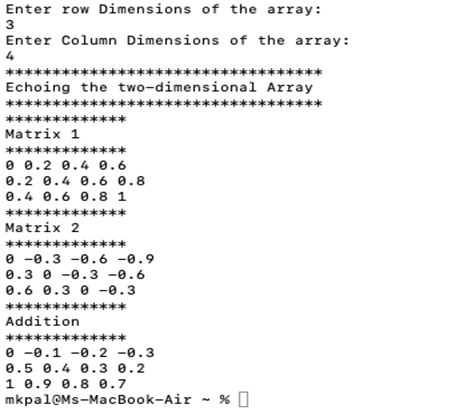
Concept explainers
Reread the code in Display 10.9. Then, write a class TwoD that implements the two-dimensional dynamic array of doubles using ideas from this display in its constructors. You should have a private member of type pointer to double to point to the dynamic array, and two int (or unsigned int) values that are MaxRows and MaxColS.
You should supply a default constructor for which you are to choose a default maximum row and column sizes and a parameterized constructor that allows the programmer to set maximum row and column sizes.
Further, you should provide a void member function that allows setting a particular row and column entry and a member function that returns a particular row and column entry as a value of type double.
Remark: It is difficult or impossible (depending on the details) to overload ( ) so it works as you would like for two-dimensional arrays. So simply use accessor and mutator functions using ordinary function notation.
Overload the + operator as a friend function to add two two-dimensional arrays. This function should return the TwoD object whose ith row, jth column element is the sum of the ith row, jth column element of the left-hand operand TWOD object and the ith row, jth column element of the right-hand operand TwoD object.
Provide a copy constructor, an overloaded operator z, and a destructor.
Declare class member functions that do not change the data as const members.
Program Plan:
- Define class named as TwoD and declare the variables for rows and columns.
- Declare a variable of pointer to double to point to the dynamic array.
- Define the default constructor and parameterized constructor to initialise rows and columns.
- Define the copy constructor that copies the values of one object array to another object array.
- Define operator + function declared as friend that add two dimensional arrays and return the sum.
- Use the setValue () function to set the values in the matrices m1 and m2 of double type.
- Finally write the main function to test the class TwoD.
Program Description:The purpose of the program is to set the values of two matrices of double type and add them to print the third matrix using the class TwoD and its constructors.
Explanation of Solution
Program:
//header files
#include <iostream>
usingnamespacestd;
//Create Class TwoD
classTwoD
{
//Private Data members
private:
intMaxRows;
intMaxCols;
//Declare array
double&Twoarr;
//Access Specifier
public:
//Create Default Constructor
TwoD()
{
//chooses default rows and columns
MaxRows=10;
MaxCols=10;
Twoarr=newdouble*[MaxRows];
for(int it =0; it <MaxRows;++it)
{
Twoarr[it]=newdouble[MaxCols];
}
}
//Create parameterised Constructor for setting the rows and columns
TwoD(int rows,int cols)
{
//chooses Default rows and columns
MaxRows= rows;
MaxCols= cols;
Twoarr=newdouble*[MaxRows];
for(int it =0; it <MaxRows;++it)
{
Twoarr[it]=newdouble[MaxCols];
}
}
//included the copy constructor
TwoD(constTwoD&matrix)
{
//rows and columns assigned to the constructor object
MaxRows=matrix.MaxRows;
MaxCols=matrix.MaxCols;
Twoarr=newdouble*[MaxRows];
for(int it =0; it <MaxRows;++it)
{
Twoarr[it]=newdouble[MaxCols];
for(intjt=0;jt<MaxCols;++jt)
{
Twoarr[it][jt]=matrix.Twoarr[it][jt];
}
}
}
//Destructor
~TwoD()
{
for(int it =0; it <MaxRows;++it)
{
delete[]Twoarr[it];
}
deleteTwoarr;
}
//member function for setting the values
voidsetValue(int row,int col,doubleval)
{
Twoarr[row][col]=val;
}
//Friend function which overloads the "+" Operator
friendTwoDoperator+(TwoD&m1,TwoD&m2)
{
TwoD*m3 =newTwoD(m1.MaxRows, m1.MaxCols);
for(int it =0; it < m3->MaxRows;++it)
{
for(intjt=0;jt< m3->MaxCols;++jt)
{
//Performs addition
m3->Twoarr[it][jt]= m1.Twoarr[it][jt]+ m2.Twoarr[it][jt];
}
}
return*m3;
}
//Void function to print the values
void print()
{
for(int it =0; it <MaxRows;++it)
{
for(intjt=0;jt<MaxCols;++jt)
{
cout<<Twoarr[it][jt]<<"";
}
cout<<endl;
}
}
};
intmain()
{
//declare variables
intmaxRows;
intmaxColumns;
//Getting inputs from the user
cout<<"Enter row Dimensions of the array:"<<endl;
cin>>maxRows;
cout<<"Enter Column Dimensions of the array:"<<endl;
cin>>maxColumns;
cout<<"&********************************"**lt;<endl;
cout<<"Echoing the two-dimensional Array"<<endl;
cout<<"&********************************"**lt;<endl;
//passing parameters to the class objects
TwoDm1(maxRows,maxColumns);
TwoDm2(maxRows,maxColumns);
for(int it =0; it <maxRows;++it)
{
for(intjt=0;jt<maxColumns;++jt)
{
m1.setValue(it,jt,0.2*(it +jt));
m2.setValue(it,jt,0.3*(it -jt));
}
}
//printing the results
cout<<"&***********"**lt;<endl;
cout<<"Matrix 1 "<<endl;
cout<<"&***********"**lt;<endl;
m1.print();
cout<<"&***********"**lt;<endl;
cout<<"Matrix 2"<<endl;
cout<<"&***********"**lt;<endl;
m2.print();
//performs the addition operation
TwoD m3 = m1 + m2;
cout<<"&***********"**lt;<endl;
cout<<"Addition "<<endl;
cout<<"&***********"**lt;<endl;
m3.print();
return0;
}
Explanation:
First, TwoD class is defined along with all the required variables and constructors. Then, from the main ()function, the instances of the class is called, the rows of the array and the column of the array are entered by the user.
The two dimensional array is echoed randomly. Two matrices of given order are generated. The sum of these two matrices are obtained and displayed on the output screen.
Output Screenshot:

Want to see more full solutions like this?
Chapter 10 Solutions
Absolute C++
Additional Engineering Textbook Solutions
Management Information Systems: Managing The Digital Firm (16th Edition)
Starting Out with Java: From Control Structures through Objects (7th Edition) (What's New in Computer Science)
Electric Circuits. (11th Edition)
Thinking Like an Engineer: An Active Learning Approach (4th Edition)
SURVEY OF OPERATING SYSTEMS
Computer Science: An Overview (13th Edition) (What's New in Computer Science)
- Could you help me to know features of the following concepts: - commercial CA - memory integrity - WMI filterarrow_forwardBriefly describe the issues involved in using ATM technology in Local Area Networksarrow_forwardFor this question you will perform two levels of quicksort on an array containing these numbers: 59 41 61 73 43 57 50 13 96 88 42 77 27 95 32 89 In the first blank, enter the array contents after the top level partition. In the second blank, enter the array contents after one more partition of the left-hand subarray resulting from the first partition. In the third blank, enter the array contents after one more partition of the right-hand subarray resulting from the first partition. Print the numbers with a single space between them. Use the algorithm we covered in class, in which the first element of the subarray is the partition value. Question 1 options: Blank # 1 Blank # 2 Blank # 3arrow_forward
- 1. Transform the E-R diagram into a set of relations. Country_of Agent ID Agent H Holds Is_Reponsible_for Consignment Number $ Value May Contain Consignment Transports Container Destination Ф R Goes Off Container Number Size Vessel Voyage Registry Vessel ID Voyage_ID Tonnagearrow_forwardI want to solve 13.2 using matlab please helparrow_forwarda) Show a possible trace of the OSPF algorithm for computing the routing table in Router 2 forthis network.b) Show the messages used by RIP to compute routing tables.arrow_forward
- using r language to answer question 4 Question 4: Obtain a 95% standard normal bootstrap confidence interval, a 95% basic bootstrap confidence interval, and a percentile confidence interval for the ρb12 in Question 3.arrow_forwardusing r language to answer question 4. Question 4: Obtain a 95% standard normal bootstrap confidence interval, a 95% basic bootstrap confidence interval, and a percentile confidence interval for the ρb12 in Question 3.arrow_forwardusing r languagearrow_forward
 C++ Programming: From Problem Analysis to Program...Computer ScienceISBN:9781337102087Author:D. S. MalikPublisher:Cengage LearningProgramming Logic & Design ComprehensiveComputer ScienceISBN:9781337669405Author:FARRELLPublisher:Cengage
C++ Programming: From Problem Analysis to Program...Computer ScienceISBN:9781337102087Author:D. S. MalikPublisher:Cengage LearningProgramming Logic & Design ComprehensiveComputer ScienceISBN:9781337669405Author:FARRELLPublisher:Cengage EBK JAVA PROGRAMMINGComputer ScienceISBN:9781337671385Author:FARRELLPublisher:CENGAGE LEARNING - CONSIGNMENT
EBK JAVA PROGRAMMINGComputer ScienceISBN:9781337671385Author:FARRELLPublisher:CENGAGE LEARNING - CONSIGNMENT C++ for Engineers and ScientistsComputer ScienceISBN:9781133187844Author:Bronson, Gary J.Publisher:Course Technology Ptr
C++ for Engineers and ScientistsComputer ScienceISBN:9781133187844Author:Bronson, Gary J.Publisher:Course Technology Ptr Microsoft Visual C#Computer ScienceISBN:9781337102100Author:Joyce, Farrell.Publisher:Cengage Learning,
Microsoft Visual C#Computer ScienceISBN:9781337102100Author:Joyce, Farrell.Publisher:Cengage Learning,




